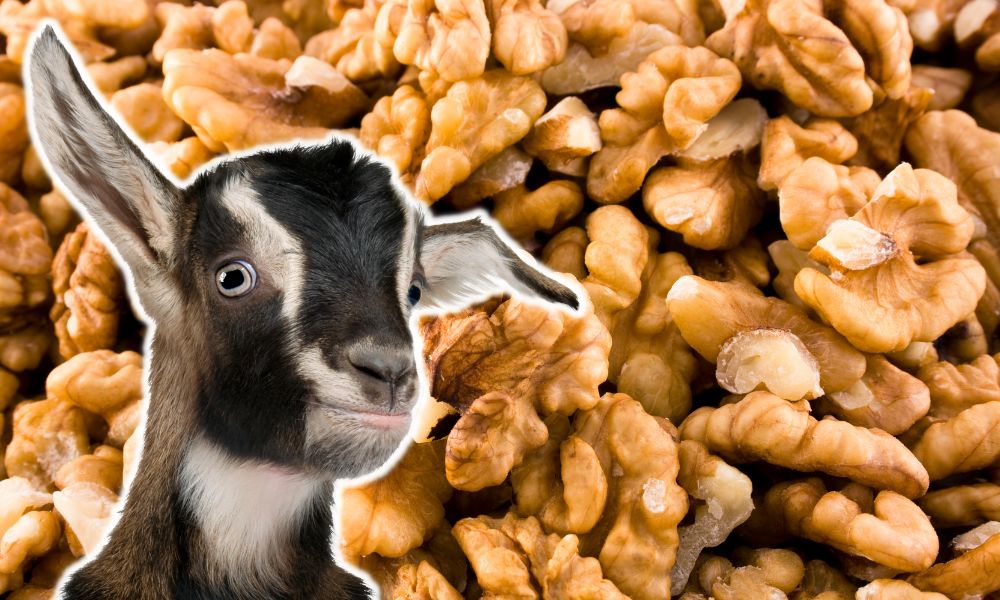Different goat owners do report different results with walnuts, but there is no real sense in taking the risk.
There are plenty of safer alternatives to walnuts as treats that your goats will love just as much.
So, let’s look at it in detail.

Are walnuts poisonous to goats?
The specific effects of walnuts on goats have not been studied in a scientific capacity, but in general, they are considered toxic to livestock.
The tree as a whole produces a compound called juglone, a very strong chemical that can kill off surrounding vegetative growth.
This, understandably, is very harmful to anything that would eat it.
The walnuts themselves, then, always pose this risk, even though they do not carry the majority of the toxin in the plant.
This is why they’re considered dangerous and toxic to goats.
So, you really should avoid deliberately feeding walnuts to your goats.
They may appear to be okay, but in reality, it could be doing both long- and short-term harm.
The fact is, too, that goats tend not to enjoy eating walnuts in any case.
Most of them avoid the dry nuts.
Goats may seem like they will eat anything, but in fact they know very well what’s good for them and what’s not, for the most part.
You may simply find, then, that your goats have no interest in eating the walnuts you bring to them.
But what about the rest of the plant?
As I said, the whole tree produces juglone, so let’s look at whether any part of it is safe.
Can goats eat walnut leaves?
If you have a walnut tree on your property, then you should be extremely cautious.
The leaves in particular are generally thought to be okay, especially if they fall off the tree first and are then eaten.
You should still always observe your goats carefully if they’re eating walnut leaves for the first time.
Don’t let them gorge themselves, just give them a few and see how they react.
If they have no problem, then walnut leaves are likely okay for them.
That said, the branches are where most of the juglone is.
You absolutely need to avoid letting your goats eat the branches as they will do this.
They will even stand on their hind legs to get at it, sometimes.
If you notice your goats doing this, you’re going to need to find a way to discourage the behavior, or have the tree removed.
There may be some ambiguity about the safety of walnuts themselves, but the trees certainly pose a number of particular risks.
As with walnuts, most goats likely will not try and eat walnut leaves or branches, but you should still always be very careful of this.
Can goats eat English walnuts?
English walnuts are one of the most common varieties you see in supermarkets, and among the most popular around the world.
English walnuts are generally thought to be safer than other varieties.
However, it’s still not completely clear that they are entirely safe.
English walnuts still contain juglone, the problematic compound.
So, for that reason, they’re best avoided.
Again, goats probably for the most part wouldn’t be interested in walnuts.
They need fibrous, plant-matter foods for the most part, and walnuts are very hard and tough.
Can goats eat black walnuts?
Black walnuts are another very common and popular variety, and in many ways are worse than others.
Small amounts of black walnut have been show to kill horses.
Studies have shown that they’re generally safe for most other animals, but the fact is they are clearly dangerous to animals.
For the safest option, do not feed your goat any variety of walnut.
The jury is somewhat out on walnuts, then.
Some goat owners do report that their goats eat walnuts, or at least parts of the trees, without any issue.
We recommend that you avoid walnuts, however, as they are potentially toxic and different goats will have different reactions.
There are plenty of great treats that your goat will love, like fresh fruit and vegetables, that don’t pose the same issue.
More in Protein
- Can Goats Eat Acorns?
- Can Goats Eat Almonds?
- Can Goats Eat Bacon?
- Can Goats Eat Brazil Nuts?
- Can Goats Eat Cashews?
- Can Goats Eat Eggs?
- Can Goats Eat Fish?
- Can Goats Eat Hazelnuts?
- Can Goats Eat Macadamia Nuts?
- Can Goats Eat Meat?
- Can Goats Eat Peanut Butter?
- Can Goats Eat Peanuts?
- Can Goats Eat Pecans?
- Can Goats Eat Pistachios?
- Can Goats Eat Walnuts?
